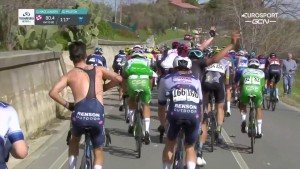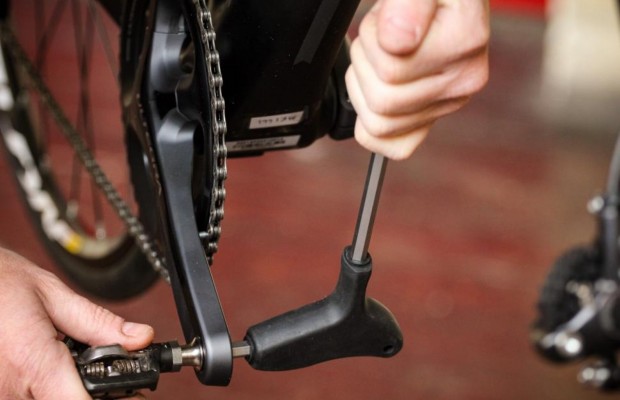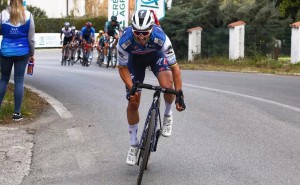Fine and controversy for taking off helmet in competition
The sanctioning of Julian Alaphilippe for taking off his helmet during the 4th stage of Tirreno-Adriatico once again raises the controversy about some UCI rules and the arbitrary application that is often made of them while other more dangerous situations are not taken into account.

UCI regulations related to safety back in the spotlight
A few days ago the 4th stage of the Tirreno-Adriatico was taking place when the television cameras captured the curious image of Julian Alaphilippe with his undershirt left over due to the unusual heat for these dates that accompanied the cyclists in the final part of the stage.
The Frenchman left us with one of those images that impress the spectator from outside cycling with respect to the skill of the cyclists on their machines and that, nevertheless, putting on and taking off clothes on the bike is one of the basic skills of the riders. However, one detail caught the eye and was echoed by the commentators on the broadcast.
RECOMENDADO

How to change the pedals of any bike in 5 steps

Alcoholic beverages with the fewest calories

What would you do if you won the lottery? This cyclist bought himself a €20,000 bike

Tips for cycling in the rain

25 cycling gifts ideas to get it right

When do helmets have to be changed? Do they have an expiration date?
To remove his jersey, Alaphilippe had to take off his helmet, something that is sanctioned by the UCI and can even lead to expulsion from the race, although on this occasion the referees were benevolent, leaving the matter at a penalty of 500 Swiss francs.
In theory, removing the helmet would carry a penalty of 200 francs and disqualification from the race, however, the strange thing about this case is that Alaphilippe seems to have been penalized under the section of the regulations referring to "damage to the image of cycling" where the 500 franc fine received would be included.

Alberto Contador himself, commentator of the Tirreno-Adriatico broadcast on Eurosport immediately noticed and commented that he had also had to suffer this sanction a few years ago when he removed his helmet to take off a cap he was wearing under it, after which he began to cut the caps to avoid having to fall into the same punishable act.
This financial penalty provoked the anger of Soudal-QuickStep manager Patrick Lefevere, who commented that the UCI must be short of money to be fining these things. Words that come from the concern that the UCI shows for this type of actions when, in turn, continues to allow very dangerous arrivals at the end of stage.
It was not the only controversial penalty of this Tirreno-Adriatico. Yesterday, before the start of the last stage, we knew the penalty of 20 seconds to Mikel Landa, then in 7th place overall for having made use of the sidewalk in one of the cobbled climbs of the previous hard stage. A sidewalk without any kind of delimitation with the road and in a situation that we continually see without sanction in the Belgian classics and that brought to the fore the arbitrariness in applying the rules by the referee-judges. In fact, finally, after the conclusion of yesterday's stage, the judges opted to reverse these last penalties, returning Landa to the position he had achieved on the bike.